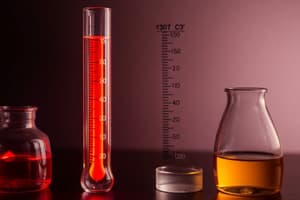Podcast
Questions and Answers
What is the primary advantage of using the metric system over other measurement systems?
What is the primary advantage of using the metric system over other measurement systems?
- It is only used in scientific fields.
- It has more units to memorize.
- It is universally accepted. (correct)
- It is based on arbitrary values.
Mass and weight refer to the same concept in physics.
Mass and weight refer to the same concept in physics.
False (B)
What is the formula to calculate density?
What is the formula to calculate density?
Density = Mass / Volume
To convert from Celsius to Kelvin, you need to add _____ to the Celsius temperature.
To convert from Celsius to Kelvin, you need to add _____ to the Celsius temperature.
Match the following definitions with their correct terms:
Match the following definitions with their correct terms:
Which unit is used to measure mass?
Which unit is used to measure mass?
Density can be used to distinguish between different substances.
Density can be used to distinguish between different substances.
What is absolute zero in Kelvin?
What is absolute zero in Kelvin?
The ________ scale starts at absolute zero and is used primarily in scientific contexts.
The ________ scale starts at absolute zero and is used primarily in scientific contexts.
Match the following terms with their definitions:
Match the following terms with their definitions:
What is the primary difference between mass and weight?
What is the primary difference between mass and weight?
The volume of a rectangular prism can be calculated using the formula: length × width × height.
The volume of a rectangular prism can be calculated using the formula: length × width × height.
How would you convert a temperature of 25°C to Kelvin?
How would you convert a temperature of 25°C to Kelvin?
Flashcards are hidden until you start studying
Study Notes
Temperature Scales
- Kelvin and Celsius are two common temperature scales
- Kelvin is used in scientific applications, while Celsius is more common in everyday life
- Kelvin scale begins at absolute zero - the theoretical point where all molecular motion stops
- Convert Celsius to Kelvin: K = °C + 273.15
- Convert Kelvin to Celsius: °C = K - 273.15
Metric System
- Advantages over other systems of measurement include consistency and ease of conversion
- Based on powers of ten
- Common units: meter (m), gram (g), liter (L)
Accuracy vs. Precision
- Accuracy refers to how close a measured value is to the true value
- Precision refers to how close repeated measurements are to each other
- A measurement can be precise without being accurate and vice versa
- Example: Imagine a dartboard, accurate throws are near the center, precise throws are all clustered together, but not necessarily in the center
Mass vs. Weight
- Mass: the amount of matter in an object
- Weight: the force of gravity acting on an object's mass
- Mass is constant, weight can change depending on location
- Example: An astronaut's mass remains constant in space, but their weight is less due to lower gravity
Density
- Density: a measure of how much mass is contained in a given volume
- Formula: Density = Mass / Volume
- Units: g/mL or g/cm³
- Applications: Identifying substances (different substances have different densities) and distinguishing among substances (mixing liquids with different densities)
Converting between Units
- Conversion factors are used to convert one unit of measurement to another
- Dimensional analysis is a method used to ensure conversions are done correctly
- Example: 1 inch = 2.54 cm
- When converting, think of the units like fractions - cancel units that appear in both numerator and denominator
Calculations
- Volume of a rectangular prism: V = l x w x h (length x width x height)
- Density can be used to calculate mass or volume using the formula: Density = Mass / Volume
Units of Measurement
- Temperature: Celsius (°C) and Kelvin (K).
- Length: Meter (m)
- Area: Square meters (m²)
- Volume: Cubic meters (m³)
- Mass: Kilogram (kg)
- Weight: Newton (N)
- Density: Kilograms per cubic meter (kg/m³)
Accuracy and Precision
- Accuracy: How close a measurement is to the true value.
- Precision: How close multiple measurements are to each other.
Metric System
- Advantages: Based on units of ten, making conversions simpler.
Kelvin and Celsius
- Kelvin: Absolute temperature scale, starts at absolute zero (-273.15 °C).
- Celsius: Relative temperature scale, based on the freezing and boiling points of water.
Conversion
- To convert from Kelvin to Celsius: Subtract 273.15 from the Kelvin value.
- To convert from Celsius to Kelvin: Add 273.15 to the Celsius value.
Mass and Weight
- Mass: The amount of matter in an object.
- Weight: The force of gravity on an object's mass.
Density
- Density: Mass per unit volume.
- Calculating density: Density = Mass / Volume
- Units: Kilograms per cubic meter (kg/m³)
- Using density to identify substances: Different substances have different densities.
Conversion Factors
- Used to convert between different units of measurement.
Volume of a Rectangular Prism
- Calculating volume: Volume = Length x Width x Height
Density Demonstrations
- Cola/diet: Diet cola is less dense than regular cola.
- Ice floating/sinking: Ice is less dense than liquid water, causing it to float.
- Density bottle: Provides a visual demonstration of how density affects the volume of a substance.
Studying That Suits You
Use AI to generate personalized quizzes and flashcards to suit your learning preferences.




